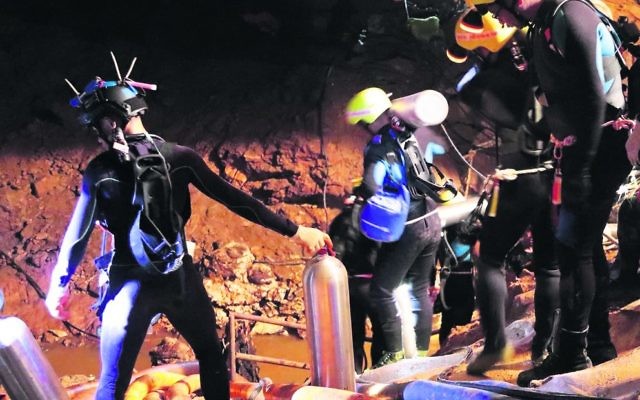Israeli tech aids Thai cave rescue
Technology powering the Thai cave rescue was provided for free, because the Israeli man who developed it wanted to act "Jewish."
Technology powering the Thai cave rescue was provided for free, because the Israeli man who developed it wanted to act “Jewish.”
Uzi Hanuni, who made “magic” radios that allow rescuers to communicate despite all the rocks between them, told The AJN that he was offered big money for his system but insisted on providing it for free.
“This is the Jewish way,” he said. “When there is a life at stake you don’t bargain, you just do your best to save those lives.”
Thai rescuers trying to free a football team trapped in a flooded cave were struggling to communicate with each other, so they turned to the Israeli company Maxtech. Its system has boosted the power of rescuers’ radios by almost 20 times.
“Two days after the disaster, our agent in Thailand heard about it and was approached by the navy seals of Thailand and was asked for a solution that could manage communication in caves,” said Maxtech’s CEO Uzi Hanuni.
“The agent approached us and said they are prepared to pay a lot of money to bring this solution . We decided we wouldn’t do it for money, we’d do it to save kids lives.”
The AJN talked to Hanuni on Monday, hours after the first four boys emerged from the cave, and he was confident that his technology contributed to the success. “Navy seals and all the rescue forces are managing the whole rescue effort with these radios, they wouldn’t be able to manage it without them.”
Normal radios used by rescuers have a range of a few kilometres in open areas, but in difficult environments like caves, the range can be tiny. Hanuni has provided special radios that “hop” voice, video and data from one to another.
Now, rescuers who are nowhere near each other can communicate with each other, so long as there are people with radios at regular intervals in-between them. Each radio picks up the signals they receive, and transmits them onwards, solving the problem of the difficult environment.
Hanuni talks about the system as a kind of “daisy chain,” explaining: “We can chain all the radios to establish communication from the edge of the tunnel to one kilometre away.”
The father-of-three came up with the idea after 9/11, and took it to the market 13 years later.
He said: “Just after September 11 I decided that rescue forces shouldn’t die in attempting rescue. Then, the tower of first responders collapsed and they couldn’t communicate with each other. So I decided to build a resilient network that doesn’t require infrastructure.”
In related news, Israel’s ambassador to Thailand Meir Shlomo visited the site of the cave. He said that Israel’s Prime Minister Benjamin Netanyahu sent him to “see what kind of aid Israel can offer to its friend Thailand.”
NATHAN JEFFAY


comments